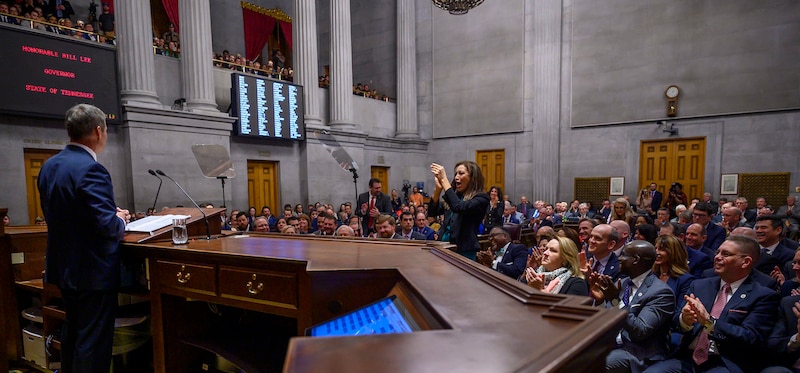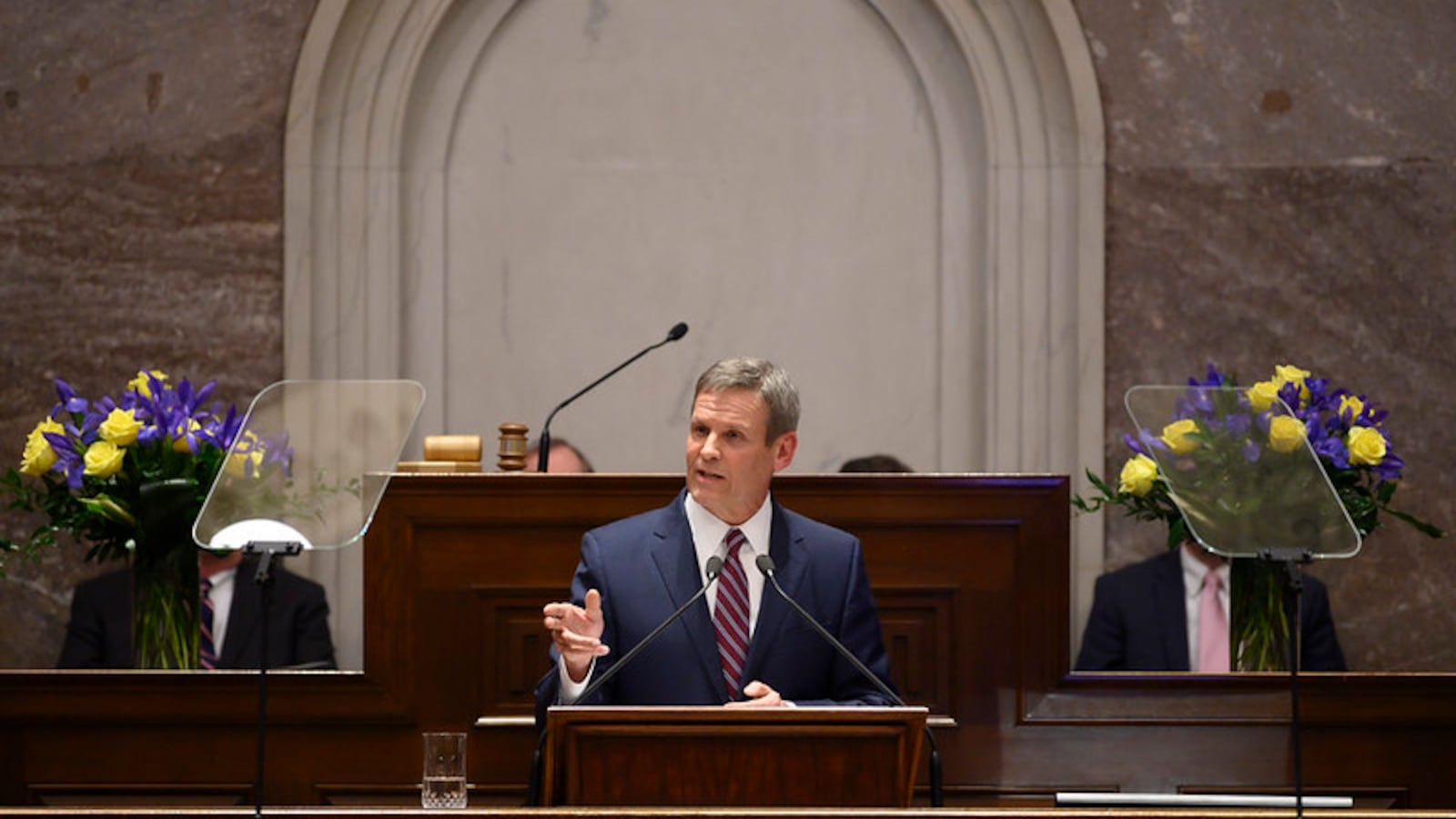Vowing to make Tennessee the best state in America to be a teacher, Gov. Bill Lee proposed $117 million more for teacher salaries and a slew of new initiatives aimed at luring more high-quality candidates to the profession and equipping them for the classroom.
The Republican governor also proposed $68 million for a new literacy program to ground teachers in phonics-based reading instruction and $25 million to support school improvement work. And he wants to create a $250 million trust fund to support and grow mental health services for students in Tennessee’s highest-risk schools.
In all, Lee asked the legislature for nearly $650 million in new dollars for K-12 education to bring the state’s total investment to $5.8 billion — about 17% of his $40.8 billion spending plan.
“Make no mistake: We will do whatever it takes to make Tennessee the best state in America to be a student, and that means making Tennessee the best state in America to be a teacher,” Lee said in his second State of the State Address before a joint session of the General Assembly.
Public education was the centerpiece of Lee’s address after focusing last year on increasing education choices for families beyond traditional public schools through education savings accounts and a new state charter school commission.
“The vast majority of our students are educated in traditional public schools,” he said, “and the majority of our efforts must remain focused there.”
Even so, the governor asked for $24 million to help charter schools with facility costs and $14 million for education savings accounts, which allow families to use taxpayer money to pay for private school tuition.
This is the second straight year Lee is seeking to bolster teacher pay. His administration set aside more than $70 million for that purpose last year, building on the compensation work of his predecessor, Bill Haslam. If applied statewide, the proposed allocation would amount to a 4% raise, although districts can funnel the additional money toward benefits or hiring more teachers, as long as their average teacher salary is at or above the state’s average of $53,980. Currently, the national average is more than $60,000, and Tennessee trails about half of its eight border states in teacher compensation.
Lee’s proposals come as Tennessee is seeing fewer teacher candidates in its training programs. At the same time, one in three current teachers report that they would leave the profession if they found a higher-paying job.
Over the next two years, the governor wants to increase the base pay for those with a bachelor’s degree and no teaching experience from $36,000 “so that no Tennessee teacher is making less than $40,000 a year.”
“This change to the salary schedule will reward teachers across the state while also making the teaching profession even more appealing to young people considering the high call of becoming an educator,” he said.
To complement salary increases, Lee wants to set aside $8.5 million to launch the Governor’s Teaching Fellowship to provide college scholarships for 1,000 of “our best and brightest” students to train to become teachers. He also proposed grants to help districts create their own teacher recruitment programs and announced plans for a first-of-its-kind competition to develop the world’s best teacher preparation program in Tennessee.
As expected, the governor recommended starting a new approach to addressing the state’s abysmal literacy rate, where just over a third of third-graders are reading at or above grade level. The comprehensive program would set aside $20 million for high-quality instructional materials and more than $48 million to instruct teachers in the “science of reading.” The latest research says the starting point to learn to read is sound, not sight, and shows that phonics instruction is crucial to that process.
In one of the most highly anticipated parts of his budget for education, Lee unveiled his plan for addressing the rising mental health needs of Tennessee students — an issue that Education Commissioner Penny Schwinn said was the top problem she heard about while touring schools last year.
Declaring that “help is on the way,” he said the creation of a $250 million endowment will lead to targeted investments in mental health services, which will be determined during a year-long needs assessment for each district.
“We will seek private donations to grow the fund over time and use the earnings to make investments for years to come,” Lee said.
In the meantime, he wants to allocate $3 million to expand services through the Department of Mental Health so that all 95 counties have at least one behavioral health liaison for their schools. Currently, that program covers only 36 counties.

The Republican governor’s $600 million boost for public schools, while significant, fell significantly short of the level called for last week by the legislature’s Democratic leaders as the state continues to enjoy revenue surpluses. Minority party leaders said Tennessee needs a $1.5 billion boost to fully fund its constitutional obligations under the state’s funding formula for K-12 education. On Monday, they called Lee’s spending plan “an early and modest step on the long road to doing right by our schools.”
“It’s only a record-setting investment in public education because Tennessee has a really bad record when it comes to funding our schools,” said Sen. Jeff Yarbro of Nashville.
During his address, Lee took a swipe at naysayers who contend that he’s more interested in diverting money to private schools than in fully funding public schools.
“When you’re back home in your districts this year, if someone tells you we’re not supporting public education, they’re not telling the truth,” he said.
Lee’s plan drew generally positive reviews from education partners across the state.
“We are encouraged by his proposals to improve and heavily invest in literacy instruction, postsecondary attainment, improving educator pay and support, and innovative approaches to recruiting and preparing the teachers of tomorrow,” said President David Mansouri of the State Collaborative on Reforming Education.
Adam Lister, who heads Tennesseans for Student Success, called it “a bold agenda to continue to drive positive generational change.”
But the president of Tennessee’s largest teacher organization said the funding increase still falls woefully short for a state that ranks 45th in per-pupil spending, especially since Lee also wants to place another $50 million into cash reserves.
“Our public schools need $1.2 billion to get us to the Southeast average and out of the bottom 10 in funding. It is something our state can afford, and it’s the best investment our state can make,” said Beth Brown, a Grundy County teacher who heads the Tennessee Education Association.
She added that the extra money for teacher pay breaks down to about $1,450 per teacher, or approximately $28 a week.

